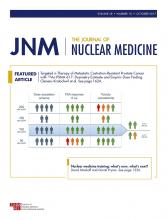Review ArticleContinuing Education
PSMA Ligands for PET Imaging of Prostate Cancer
Sarah M. Schwarzenboeck, Isabel Rauscher, Christina Bluemel, Wolfgang P. Fendler, Steven P. Rowe, Martin G. Pomper, Ali Asfhar-Oromieh, Ken Herrmann and Matthias Eiber
Journal of Nuclear Medicine October 2017, 58 (10) 1545-1552; DOI: https://doi.org/10.2967/jnumed.117.191031
Sarah M. Schwarzenboeck
1Department of Nuclear Medicine, Rostock University Medical Centre, Rostock, Germany
Isabel Rauscher
2Department of Nuclear Medicine, Klinikum rechts der Isar, Technical University of Munich, Munich, Germany
Christina Bluemel
3Department of Nuclear Medicine, University Hospital Würzburg, Würzburg, Germany
Wolfgang P. Fendler
4Department of Molecular and Medical Pharmacology, David Geffen School of Medicine at UCLA, Los Angeles, California
5Department of Nuclear Medicine, Ludwig-Maximilians-University of Munich, Munich, Germany
Steven P. Rowe
6Russell H. Morgan Department of Radiology and Radiological Science, Johns Hopkins University School of Medicine, Baltimore, Maryland
Martin G. Pomper
6Russell H. Morgan Department of Radiology and Radiological Science, Johns Hopkins University School of Medicine, Baltimore, Maryland
Ali Asfhar-Oromieh
7Department of Nuclear Medicine, Heidelberg University Hospital, Heidelberg, Germany
8Clinical Cooperation Unit Nuclear Medicine, German Cancer Research Centre, Heidelberg, Germany; and
Ken Herrmann
4Department of Molecular and Medical Pharmacology, David Geffen School of Medicine at UCLA, Los Angeles, California
9Klinik für Nuklearmedizin, Universitätsklinikum Essen, Essen, Germany
Matthias Eiber
2Department of Nuclear Medicine, Klinikum rechts der Isar, Technical University of Munich, Munich, Germany
4Department of Molecular and Medical Pharmacology, David Geffen School of Medicine at UCLA, Los Angeles, California

Data supplements
Supplemental Data
Files in this Data Supplement:
In this issue
Journal of Nuclear Medicine
Vol. 58, Issue 10
October 1, 2017
PSMA Ligands for PET Imaging of Prostate Cancer
Sarah M. Schwarzenboeck, Isabel Rauscher, Christina Bluemel, Wolfgang P. Fendler, Steven P. Rowe, Martin G. Pomper, Ali Asfhar-Oromieh, Ken Herrmann, Matthias Eiber
Journal of Nuclear Medicine Oct 2017, 58 (10) 1545-1552; DOI: 10.2967/jnumed.117.191031
PSMA Ligands for PET Imaging of Prostate Cancer
Sarah M. Schwarzenboeck, Isabel Rauscher, Christina Bluemel, Wolfgang P. Fendler, Steven P. Rowe, Martin G. Pomper, Ali Asfhar-Oromieh, Ken Herrmann, Matthias Eiber
Journal of Nuclear Medicine Oct 2017, 58 (10) 1545-1552; DOI: 10.2967/jnumed.117.191031
Jump to section
Related Articles
Cited By...
- Additive Value of [68Ga]Ga-RM26 PET/CT to [68Ga]Ga-PSMA-617 PET/CT in Detecting Pelvic Lymph Node Metastasis in Prostate Cancer: A Prospective, Single-Center, Phase II Study
- Comparison of 68Ga-PSMA-617 PET/CT and 68Ga-RM2 PET/CT in Patients with Localized Prostate Cancer Who Are Candidates for Radical Prostatectomy: A Prospective, Single-Arm, Single-Center, Phase II Study
- Molecular Imaging of Neuroendocrine Prostate Cancer by Targeting Delta-Like Ligand 3
- Disparities in PET Imaging for Prostate Cancer at a Tertiary Academic Medical Center
- Microparticle Encapsulation of a Prostate-targeted Biologic for the Treatment of Liver Metastases in a Preclinical Model of Castration-resistant Prostate Cancer
- Intraoperative 68Ga-PSMA Cerenkov Luminescence Imaging for Surgical Margins in Radical Prostatectomy: A Feasibility Study
- Multiphasic 68Ga-PSMA PET/CT in the Detection of Early Recurrence in Prostate Cancer Patients with a PSA Level of Less Than 1 ng/mL: A Prospective Study of 135 Patients
- Impact of 68Ga-PSMA-11 PET/CT on Staging and Management of Prostate Cancer Patients in Various Clinical Settings: A Prospective Single-Center Study
- Diagnostic Value of 68Ga-PSMA PET/CT for Detection of Phosphatase and Tensin Homolog Expression in Prostate Cancer: A Pilot Study
- Total-Body 68Ga-PSMA-11 PET/CT for Bone Metastasis Detection in Prostate Cancer Patients: Potential Impact on Bone Scan Guidelines
- Can the Injected Dose Be Reduced in 68Ga-PSMA-11 PET/CT While Maintaining High Image Quality for Lesion Detection?
- Predictors of Overall and Disease-Free Survival in Metastatic Castration-Resistant Prostate Cancer Patients Receiving 225Ac-PSMA-617 Radioligand Therapy
- Lymph Node Involvement in Treatment-Naive Prostate Cancer Patients: Correlation of PSMA PET/CT Imaging and Roach Formula in 280 Men in Radiotherapeutic Management
- Prostate-Specific Membrane Antigen Ligand Positron Emission Tomography in Men with Nonmetastatic Castration-Resistant Prostate Cancer
- Simplified Methods for Quantification of 18F-DCFPyL Uptake in Patients with Prostate Cancer
- Improving 68Ga-PSMA PET/MRI of the Prostate with Unrenormalized Absolute Scatter Correction
- Bridging the Imaging Gap: PSMA PET/CT Has a High Impact on Treatment Planning in Prostate Cancer Patients with Biochemical Recurrence--A Narrative Review of the Literature
- Preclinical Evaluation and Pilot Clinical Study of Al18F-PSMA-BCH for Prostate Cancer PET Imaging
- Near-Infrared Dye-Labeled Anti-Prostate Stem Cell Antigen Minibody Enables Real-Time Fluorescence Imaging and Targeted Surgery in Translational Mouse Models
- Potential Impact of 68Ga-PSMA-11 PET/CT on the Planning of Definitive Radiation Therapy for Prostate Cancer
- Intraindividual Comparison of 18F-PSMA-1007 and 18F-DCFPyL PET/CT in the Prospective Evaluation of Patients with Newly Diagnosed Prostate Carcinoma: A Pilot Study
- Comparison of 68Ga-PSMA-11 and 18F-Fluciclovine PET/CT in a Case Series of 10 Patients with Prostate Cancer Recurrence
- Impact of 68Ga-PSMA-11 PET/CT on the Management of Prostate Cancer Patients with Biochemical Recurrence
- Synthesis and Binding of a Novel PSMA-specific Conjugate
- PSMA PET: Transformational Change in Prostate Cancer Management?
- 68Ga-PSMA-11 PET/CT Mapping of Prostate Cancer Biochemical Recurrence After Radical Prostatectomy in 270 Patients with a PSA Level of Less Than 1.0 ng/mL: Impact on Salvage Radiotherapy Planning






